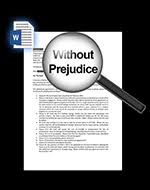Preliminary Legal Issues for Determination: When to Raise Them.
1.Introduction
Parties go to court because they are unable to settle their disputes amicably. The rules of court have been enacted to provide an avenue for parties to settle their disputes amicably, effectively and efficiently. It is trite that after pleadings are closed the originator of the action, commonly referred to as the Plaintiff, is required to file an application for directions, outlining the issues which are joined between the Parties for adoption by the Court. The Defendant may also file additional issues for consideration by the court. The issues which are subsequently adopted by the Court, are the issues which must be resolved by the Court.
The normal expectation of a litigant is that the case be determined on the merits only after a full trial, during which evidence, oral and/or documentary, are adduced. However, there are some issues which arise from the pleadings which may be resolved before the trial. Such issues have been referred to in the rules of Court as Preliminary Legal Issues.
The purpose of this article is to discuss how and when preliminary legal issues can be raised by a party to an action to ensure speedy and effective determination of the matters in dispute.
2. Difference Between Preliminary Legal Issues and Preliminary Legal Objections.
“Preliminary legal issues” for determination are not the same as “preliminary legal objections”. Preliminary legal issues refers to issues which arise out of pleadings and which determination will substantially deal with the issue on the merits. A preliminary legal objection, on the other hand, refers to legal objections raised against any court process which is filed on the basis that either the court has no jurisdiction, or the process has been filed in defiance of any applicable statute. The determination of such legal objection may result in either the court declaring the said process as having been properly filed or not, or in the case of the court’s jurisdiction, as having been properly invoked or not.
Whereas preliminary issues can be raised based on facts or law, or a mixture of both, , preliminary legal objections must be based on only legal points which are apparent on the face of the process filed. This does not require documentary or affidavit evidence to prove.
Benin JA (as he was then) explained the difference between the terms in Anim-Addo & Ors. v. Addae-Mensah & Ors[2]. In that case, the respected jurist concluded that a preliminary legal objection is not to take the place of a defence to the substance of the statement of claim or an opposition to an application. The preliminary legal objection will include such matters as jurisdiction of the court, statute of limitation or any other legal point which can be taken at the early stage of litigation and which can be disposed of summarily at that stage. It is when any such preliminary legal objection has been disposed of, that the Defendant may raise any defence he may have to the statement of claim or opposition to the motion. He further opined that preliminary legal objection will not include matters like capacity of the plaintiff, res judicata, estoppel, etc. which actually call for pleadings and evidence to establish at the trial itself. The judge concluded that a plea that a matter was res judicata can only be dealt with as a preliminary issue for determination after pleadings are closed and not as a preliminary objection to an application for accounts which was filed subsequent to the filing of the Writ of Summons and Statement of Claim.
The fact that preliminary legal issues can include questions of both facts and law was confirmed by the Supreme Court in Republic v. High Court (Land Division), Accra, Ex Parte Lands Commission (Nungua Stool & Ors. Interested Parties)[3], where the Court held: “Jurisdictional questions, questions of illegality and indeed other legal objections, pleas or questions in law, invoked in any cause or matter raise issues of mixed facts and law. Inexorably, such questions must be founded on facts. Admittedly, some jurisdictional questions raised by a subsequent stage of the trial process, are straightforward, devoid of any fundamental factual controversies or complexities and therefore not difficult to determine; the reason being that the facts on which a particular question is anchored are undisputed.”
3.What Do the Rules of Court Say About Preliminary Legal Issues?
Order 33 rule 3 of the High Court (Civil Procedure) Rules provides as follows:
“The Court may order any question or issue arising in any cause or matter whether of fact or law, or partly of fact and partly of law, and raised by the pleadings to be tried before, at or after the trial of the cause or matter and may give directions as to the manner in which the question or issue shall be stated.”
Order 33 rule 5 further provides that “Where it appears to the Court that the decision of any question or issue arising in any cause or matter and tried separately from the main cause or matter substantially disposes of the cause or matter or renders trial of the main cause or matter unnecessary, it may dismiss the cause or matter or make such other order or give such judgment as may be just.”
A fortiori, Order 33 rule 4 (2) empowers the High Court to determine how different issues arising from the pleadings are to be tried and at what times different issues may be tried. Order 33 rules 4 (2) provides that “In an action different questions or issues may be ordered to be tried at different places or by different modes of trial and one or more questions or issues may be ordered to be tried before the others.”
Upon a reading of the rules as a whole, the author is of the opinion that preliminary legal issues are issues which:
- Must be raised from the pleadings filed by the parties, after close of pleadings.
- May be a mixture of facts and law or either of the two.
- May be tried before the trial of the substantive matter.
- If determined, may dispose of the matter and render the trial of the substantive matter unnecessary.
4.When Can Preliminary Legal Issues Be Raised?
The rules of court reproduced above indicate that “The Court may order any question or issue arising in any cause or matter whether of fact or law, or partly of fact and partly of law, and raised by the pleadings to be tried before, at or after the trial of the cause or matter and may give directions as to the manner in which the question or issue shall be stated.”
The rules do not state any specific time that preliminary legal issues could be set down for trial, save that it can be tried before the trial of the substantive matter, as the court may direct.
It is trite that the issues which are set down for trial are either set down at the application for direction stage under Order 32 of CI 47, or after an unsuccessful Pre-trial Settlement Conference, in a Commercial matter under Order 58 of CI 47.
Order 32 rule (1) of CI 47 provides that “In every action to which this rule applies, an application for directions shall be made to enable the Court consider the preparations for trial, so that:
(a) all matters which have not already been dealt with, may so far as possible, be dealt with; and
(b) directions may be given as to the future course of the action as appear best to secure the just, expeditious and inexpensive disposal of it.”
A careful reading of Order 32 rule 1 (a) makes it very clear that it was intended by the Rules of Court Committee that certain issues or matters could be dealt with by the Court even before the application for direction stage. That is why the phrase “all matters which have not already been dealt with” was used in Order 32 rule 1 (a). The author is of the opinion that the provisions of Order 33 rules 3 and 5 are some of the avenues by which the Court may determine some matters or issues before the application for direction stage.
Now, for matters before the Commercial Court, Order 58 rule 8 provides that “If no amicable settlement is reached, the pre–trial judge shall at the time settlement broke down, direct the parties to the Administrator who shall immediately fix a date before another judge on the issues set down for hearing at the pre-trial settlement conference. The hearing date shall not exceed twenty-one days from the time settlement broke down.”
But the Pre-Trial Settlement Conference can only commence after pleadings are closed. Order 58 rule 4 (1) provides that “After a Reply has been filed or the time for filing the Reply has elapsed, the Administrator of the Commercial Court shall, within three days assign the case to one of the Commercial Court Judges, to conduct a pre-trial settlement conference.”
From a purposive reading of Order 32 and order 33, the author contends that as soon as pleadings are closed, a party to an action may file an application for the court to make an order for some issues arising out of the pleadings to be set down as the preliminary issues for determination. The jurisdiction of the Court to set down preliminary issues for determination can be invoked as soon as pleadings are closed and not only after application for direction stage or after pre-trial settlement conference.
This position is fortified by the decisions of the Supreme Court on how matters/issues such as Capacity to commence an action, can be determined as a preliminary issue even before the application for direction stage and before trial.
In the case of Nii Tetteh Kpobi Tsuru v. Agri Cattle & Ors.[4], the Supreme Court held that “The law is trite that capacity is a fundamental and crucial matter that affects the very root of a suit and for that matter, it can be raised at any time even after judgment on appeal. The issue is so fundamental that when it is raised at an early stage of the proceedings a court mindful of doing justice ought to determine that issue before further proceedings are taken to determine the merits of the case.”
Here, the Supreme Court is directing that as soon as the issue of the capacity of a Plaintiff to an action is raised from the pleadings, that issue must be determined irrespective of the stage the proceedings have reached. It means that the Court has the jurisdiction to set down an issue such as the capacity of a Plaintiff as a preliminary issue for determination as soon as that issue becomes evident from the pleadings.
However, for an issue to be set down as a preliminary issue for determination, the criteria set above must be met by the Applicants. Where the issues which have been proposed to be set down as preliminary issue for determination do not satisfy the requirements in the provisions of Order 33 rule 5, the court shall decline the invitation.
In the case of Ofei Mante v. Mike Similao[5], it was held by the Supreme Court that,
“From a fair reading of the rule, we are of the opinion that if an order for the trial of a preliminary point of law would not achieve the purpose of Order 33 r 5, then the decision directing the trial of the issue is unjustified.”
The Supreme Court further held that:
“Contrary to what might have weighed upon the mind of the learned trial Judge, preliminary points of law need not necessarily be tried before the action goes to trial but may in the words of Order 33 rule 3, be tried “before, at or after the trial of the cause of matter.” We think that courts should give careful consideration to such applications before deciding which of the three options open to them would choose. The decision as to which particular Order is dependent on the circumstances of the case. Where such a point cannot be conveniently tried before the trial of the main action, then the preferrable approach is to allow the point of law, or fact or both to proceed to trial so that after receiving all the evidence in the matter, the court may determine the point. The issue of res judicata need not be determined separately, but may, subject to the particular circumstances of the case, be determined “at…the trial of the main cause or matter.”
In the case of Pharmanova v. Mudu Construction[6], the Court of Appeal, speaking through Kyei-Baffour JA held that, “At the trial below, even though the parties had filed for directions the court had not yet undertaken its duty of giving directions as to the future course of the trial of the action. The rule 5 of Order 33 under which the learned trial Judge acted grants power to the court to try a preliminary issue as it may arise in an action. See Republic of Bolivia v Bolivian Navigation Co (1876) 24 W.L 361. And indeed, it has been held that an issue which set down for preliminary trial which involves dealing with the whole subject matter of the action without evidence is not a preliminary point and should not be ordered to be tried as such. The authorities are clear that a preliminary question of law or fact should be carefully framed with intent to avoid problems of interpretation as to the real question which has been ordered to be tried. See Allen v Gulf Oil Refining Ltd [1980] Q.B 156.”
From the ratio of the cases referred to above, the Court would be slow to adopt issues as preliminary issues for determination before trial if the resolution of the proposed issues will substantially dispose of the entire matter.
5.Conclusion
The rules of court are meant to be interpreted and applied to promote speedy justice. Order 1 rule 1 (2) of CI 47 provides that: “These Rules shall be interpreted and applied so as to achieve speedy and effective justice, avoid delays and unnecessary expense, and ensure that as far as possible, all matters in dispute between parties may be completely, effectively and finally determined and multiplicity of proceedings concerning any of such matters avoided.”
It is the opinion of the author that the jurisdiction of the High Court can be invoked to set down issues after close of pleadings and before application for direction, as preliminary issues for determination as long as the issues meet the requirements in Order 33 rule 5 of CI 47. This jurisdiction of the Court, if timeously invoked, may indeed lead to a speedy resolution of matters without a full trial.
[1] The author is a Lead Consultant with Robert Smith Law Group, a Boutique Law Firm based in Accra-Ghana and assists with the teaching of Civil Procedure at the Ghana School of Law, Makola Campus.
[2] [1995-1996] 1 GLR 15
[3] [2013-2014] 2 SCGLR 1241
[4] Civil Appeal No.: J4/15/2019
[5] [2017-2018] 2 SCLRG 431
[6] SUIT NO: H1/56/2020




Nice piece.
Let’s discuss this further in class,
Bobby. Thanks for the education!
Bobby, very good write up but you should check C.I. 133 to review your work. The whole of Order 58 of C.I. 47 has been amended by C.I. 133.
Secondly, the highlighted part of Order 32 which says ‘all matters not dealt with will be dealt with’ connotes that those matters would be dealt with at the application for directions stage and NOT before Application for Directions. This is because after close of pleadings, the next step is Application for Directions under Order 32. So if at the Order 32 stage, you raise any preliminary issue, it is at that stage that it ought to be determined. It means therefore that a preliminary issue can be raised at the Application for Directions stage and especially where the issue can be determined by legal arguments, it will be set down by the judge and taken before other issues. Thus, where that point disposes of the entire case, the judge can proceed to pronounce judgment.
Above is my humble opinion. You may share further thoughts on the write up if you deem necessary for learning. Keep up the good work you are doing.
A very insightful article. Great job.
Insightful as always. Thank you